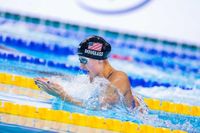The 2025 Swimming World Cup kicked off in electrifying fashion on October 10 in Carmel, Indiana, as the world’s fastest swimmers dove into the short course meters pool for the first finals session of the series. With a packed house cheering and elite athletes from across the globe vying for supremacy, the night was brimming with record-chasing performances, razor-thin finishes, and a palpable sense of anticipation for what’s to come over the three-day meet.
The evening’s action started with the women’s 400 freestyle, where Australia’s Lani Pallister wasted no time in making her mark. Pallister, who holds the Oceanian record in this event, powered through the water to claim gold with a time of 3:54.38—just a whisker off her own record of 3:53.73 set in 2024. Anna Peplowski led the field at the first 100 meters, but by the halfway mark, Pallister had seized control, flipping in 1:54.38. She only widened her lead from there, ultimately finishing more than four seconds ahead of her nearest rival. New Zealand’s Erika Fairweather (3:58.83) and Caitlin Deans (4:00.93) completed the podium, making it a sweep for Oceanian swimmers. Fairweather was the only other athlete to break the four-minute barrier, a testament to the depth of talent in the region.
In the men’s 400 freestyle, the crowd was treated to a thrilling back-and-forth battle. Carson Foster of CLB surged to victory with a time of 3:37.80, outpacing Australia’s Sam Short (3:38.15) and French star Leon Marchand (3:38.25). Marchand’s time came from the morning’s prelims, but it held up for bronze as Foster and Short dueled in the evening’s fastest heat. Short led early, but Foster’s finishing kick was too strong, as he reeled in both Short and Kieran Smith in the final 50 meters. “It was a tough field, but I just focused on my own race plan and trusted my training,” Foster said after the race, reflecting the competitive spirit that defined the night.
The sprint events kept the energy high, especially in the women’s 50 backstroke. Australia’s Kaylee McKeown, already a double-double Olympic backstroke champion, delivered another statement swim with a 25.42 for gold. She came tantalizingly close to both the World Cup and U.S. Open records, missing by just fractions of a second. Fellow Aussie Mollie O’Callaghan (25.80) edged out Katharine Berkoff (25.82) and Mexico’s Celia Pulido Ortiz (25.83) in a nail-biting finish for the minor medals. The World Cup’s unique format—no relays or semifinals—gave sprinters like O’Callaghan a rare chance to shine in the backstroke, and she didn’t disappoint.
One of the night’s most anticipated showdowns unfolded in the men’s 200 backstroke. Hungarian sensation Hubert Kos, the reigning world champion and European record holder, paced himself perfectly. He sat in second at the halfway point behind Marchand, who led with a 52.60 split. But Kos surged past in the final 50 meters, closing with 13.26 and 13.20 splits to finish in 1:46.84. Marchand hung on for silver in 1:47.68, while American Shaine Casas clocked 1:49.81 for bronze. The trio reprised their podium camaraderie from the summer’s World Championships, but this time, Kos had the upper hand in the short course format.
American Regan Smith delivered the performance of the evening in the women’s 200 butterfly, rewriting the record books with a 2:00.28. By doing so, Smith set new World Cup, American, and U.S. Open records, becoming the third-fastest performer in history for the event. She trailed teammate Alex Shackell at the first turn but stormed into the lead by the halfway mark and never looked back. Shackell thrilled the home crowd with a silver in 2:02.51, while Ireland’s Ellen Walshe took bronze in 2:05.07. Smith’s calculated decision to scratch the 50 backstroke and focus on the 200 fly paid off in historic fashion.
The men’s 100 butterfly saw Switzerland’s Noe Ponti light up the pool with a new U.S. Open record of 48.53. Ponti was in command from the start, splitting 22.66 at the halfway point and pulling away on the back half. Canada’s Ilya Kharun (49.02) and South Africa’s Chad le Clos (49.57) rounded out a podium that saw all three medalists dip under the 50-second mark. Ponti’s performance continues his meteoric rise in short course meters, following his world record set in 2024.
Another American star, Kate Douglass, made headlines in the women’s 200 breaststroke. Douglass shattered her own U.S. Open record with a 2:13.97, finishing well ahead of Germany’s Anna Elendt (2:17.80) and South Africa’s Rebecca Meder (2:18.14). Douglass, who earlier in the day broke Lilly King’s previous record in prelims, left no doubt about her dominance in this event. Elendt’s silver was especially sweet, as she broke the German record twice in one day—first in prelims, then again in the final.
The men’s 100 breaststroke final was a showcase for Dutch talent, as Caspar Corbeau out-touched a field stacked with Indiana Hoosiers alumni and current NCAA stars. Corbeau’s winning time of 56.67 was just ahead of Ilya Shymanovich (57.18) and Van Mathias (57.26), with the top six finishers all having ties to Indiana’s powerhouse program. “It felt like a Hoosier reunion out there,” Corbeau joked poolside, highlighting the strong collegiate pipeline feeding into international success.
From the opening relays to the final sprints, the first night of the 2025 Swimming World Cup in Carmel delivered fireworks and set the stage for even more drama in the days to come. Records were challenged, new stars emerged, and familiar names reminded everyone why they’re at the top of their game. With two more days of competition ahead, fans can expect the action to only intensify as the world’s best swimmers chase more medals and perhaps a few more entries in the record books.
As the session drew to a close, the buzz around the pool deck was unmistakable. With so many events still to come, all eyes remain on Carmel, Indiana, where history is being made one race at a time.

